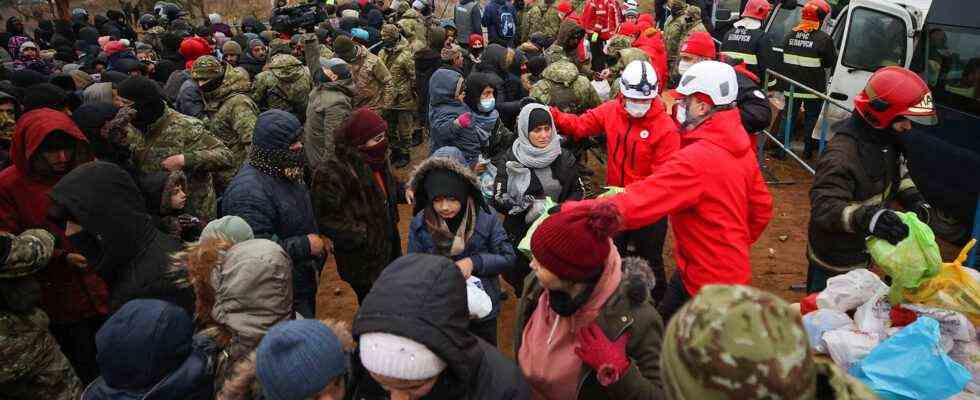Status: 11/16/2021 12:34 p.m.
The situation on the Polish-Belarusian border is becoming increasingly tense. There were clashes between border officials and migrants. Meanwhile, a solution is being struggled internationally. Chancellor Merkel phoned the ruler Lukashenko.
According to Polish sources, clashes between Polish border officials and the refugees stuck there have occurred on the border between Poland and Belarus. One policeman was seriously injured. “The migrants attacked our soldiers and officials with stones and are trying to destroy the fence and come to Poland,” said the Defense Ministry in Warsaw on Twitter. “Our forces used tear gas to stop the migrants’ aggression.”
Meanwhile, the Belarusian ruler Alexander Lukashenko assured, according to the state news agency Belta, that he wanted to avoid a “confrontation” at the border. “We cannot allow this so-called problem to lead to a heated confrontation,” he said. “The most important thing now is to protect our country and our people and not allow clashes.”
Merkel got involved
In view of the growing need of several thousand migrants at the border, Chancellor Merkel has intervened again: She phoned Lukashenko yesterday. The phone call was about “the difficult situation on the border between Belarus and the European Union,” said government spokesman Steffen Seibert. According to Seibert, Merkel and Lukashenko have agreed further talks.
Lukashenko wants to talk to Merkel again
According to a report by Belarusian state television, the conversation lasted about 50 minutes. It was discussed how an escalation of the situation at the border could be prevented. It was the first time since the controversial presidential election in Belarus in August last year that Merkel spoke to Lukashenko.
Lukashenko apparently wants to speak to Merkel a second time about the fate of the refugees on the border with Poland. This was reported by the official Belarusian news agency Belta. Lukashenko said that he had made a proposal to Merkel to solve the crisis. The Chancellor wanted to discuss this with European partners. Lukashenko said that talks are also pending with Russian President Vladimir Putin, who had offered to mediate in the conflict.
French President Emmanuel Macron and Putin also spoke on the phone. They agreed that a de-escalation of the crisis was necessary, said a French government official after the two-hour conversation. “The aim of this call was to put an end to the crisis.” However, there is still no agreement on the origin of the conflict.
Greens: phone call is “devastating”
For her phone call with Lukashenko, Merkel was sharply criticized by the foreign policy spokesman for the Greens in the Bundestag, Omid Nouripour. He found it “devastating that Ms. Merkel spoke to him on the phone,” said Nouripour in the Deutschlandfunk.
Nouripour said: “There is a very clear policy, agreed in the European Council, that Lukashenko is not recognized, is not the legitimate president of Belarus – and Ms. Merkel completely thwarted that yesterday.” With the phone call, Merkel made a contribution to the recognition and legitimation of Lukashenko’s election, according to Nouripour’s accusation. “The few people who are now in the cold are not the problem. The problem is the blackmail attempt.”
On the one hand, Nouripour called for support to the affected EU countries such as Poland, Latvia and Lithuania, but also to remind them of what EU law is and that illegal pushbacks are unacceptable. At the same time, the refugees in the border area must be helped. “That means that everyone has the right to apply for asylum.”
Poland: “People talk over our heads”
Poland’s Deputy Prime Minister Jaroslaw Kaczynski expressed general skepticism about the international involvement in the migrant crisis. “You have to consider that internationalization is certainly necessary, but not in such a way that you talk over our heads, and such suggestions are made,” said the head of the national-conservative ruling party PiS on Polish public radio. If international efforts fail, Poland will have to reckon with a deepening of the crisis and “even greater audacity on the part of our opponents,” said Kaczynski.
EU foreign ministers decided on new sanctions
On Poland’s border with Belarus, thousands of migrants on the Belarusian side are waiting in makeshift camps in the forest at temperatures around freezing point. The EU accuses Lukashenko of bringing refugees from crisis regions to the EU’s external border in an organized manner. It is suspected that he wants to avenge himself for the EU sanctions.
That is why the foreign ministers of the EU states yesterday decided on a new sanction instrument against those involved in the smuggling of migrants to Belarus. The EU will now be able to target people and institutions who have contributed to the Belarusian regime being able to use people for political purposes, the Council of Member States announced.

